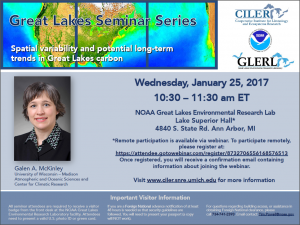Presented By: Cooperative Institute for Great Lakes Research (CIGLR)
Great Lakes Seminar Series
Galen McKinley

Please join CILER and NOAA GLERL for a Great Lakes Seminar Series presentation:
Presenter: Galen McKinley, Professor, University of Wisconsin
Title: Spatial variability and potential long-term trends in Great Lakes carbon
To participate remotely, please register at: https://attendee.gotowebinar.com/register/8732706556168576513.
Abstract: Biogeochemical and carbon cycling in Great Lakes occurs in the context of a highly variable aquatic landscape that is significantly impacted by physical forcing. In order to understand biogeochemical cycling in its mean state and as it changes, we must quantify the role of physical variability in space and time. Here, three carbon cycle examples will be presented. In Lake Superior, analysis of a coupled hydrodynamic-biogeochemical model (MITgcm.Superior) shows that physical gradients cause large variation in rates of both production (P) and respiration (R) between nearshore and offshore waters. Accounting for this variability helps to bring the lake-wide carbon budget into balance (Bennington et al. 2012, JGR). In the model, fluxes of organic carbon from nearshore lead to elevated R:P ratios in the slope region, which could support the observed enhanced heterotrophic biomass on the slope (McKinley and Bennington, in prep). Lastly, in all the Great Lakes, I demonstrate that increasing atmospheric CO2 should lead to a reduction of pH by ~0.3 units by 2100, quantitatively the same as projections for “ocean acidification” in the global oceans. In the Great Lakes, the existing carbon cycle observational system is insufficient to track such changes (Phillips et al. 2015).
Bio: Professor McKinley studies the mechanisms of the carbon cycle in the global oceans and Great Lakes, with her research lying at the intersection of physical and chemical oceanography. Her primary tools are numerical models and analysis of large datasets. More specifically, her research addresses the physical drivers of ecosystem and carbon cycle variability in the North Atlantic, global oceans and Great Lakes. Professor McKinley teaches oceanography and climate science in the Department of Atmospheric and Oceanic Sciences at University of Wisconsin – Madison. She is also very active in service to the national and international scientific and policy-making communities.
_____________________________________________________
Questions? Contact Mary Ogdahl: ogdahlm@umich.edu
Presenter: Galen McKinley, Professor, University of Wisconsin
Title: Spatial variability and potential long-term trends in Great Lakes carbon
To participate remotely, please register at: https://attendee.gotowebinar.com/register/8732706556168576513.
Abstract: Biogeochemical and carbon cycling in Great Lakes occurs in the context of a highly variable aquatic landscape that is significantly impacted by physical forcing. In order to understand biogeochemical cycling in its mean state and as it changes, we must quantify the role of physical variability in space and time. Here, three carbon cycle examples will be presented. In Lake Superior, analysis of a coupled hydrodynamic-biogeochemical model (MITgcm.Superior) shows that physical gradients cause large variation in rates of both production (P) and respiration (R) between nearshore and offshore waters. Accounting for this variability helps to bring the lake-wide carbon budget into balance (Bennington et al. 2012, JGR). In the model, fluxes of organic carbon from nearshore lead to elevated R:P ratios in the slope region, which could support the observed enhanced heterotrophic biomass on the slope (McKinley and Bennington, in prep). Lastly, in all the Great Lakes, I demonstrate that increasing atmospheric CO2 should lead to a reduction of pH by ~0.3 units by 2100, quantitatively the same as projections for “ocean acidification” in the global oceans. In the Great Lakes, the existing carbon cycle observational system is insufficient to track such changes (Phillips et al. 2015).
Bio: Professor McKinley studies the mechanisms of the carbon cycle in the global oceans and Great Lakes, with her research lying at the intersection of physical and chemical oceanography. Her primary tools are numerical models and analysis of large datasets. More specifically, her research addresses the physical drivers of ecosystem and carbon cycle variability in the North Atlantic, global oceans and Great Lakes. Professor McKinley teaches oceanography and climate science in the Department of Atmospheric and Oceanic Sciences at University of Wisconsin – Madison. She is also very active in service to the national and international scientific and policy-making communities.
_____________________________________________________
Questions? Contact Mary Ogdahl: ogdahlm@umich.edu